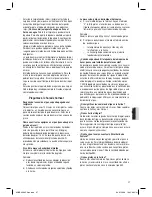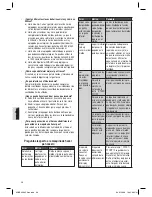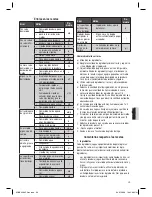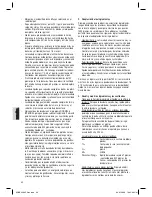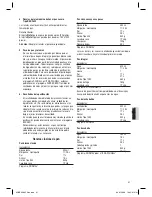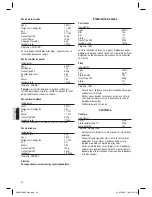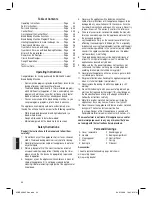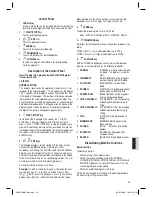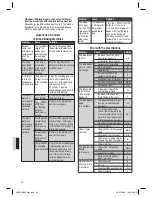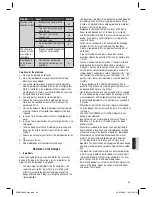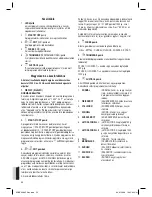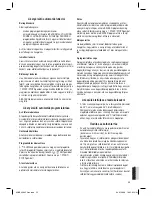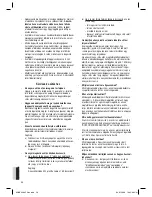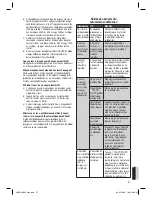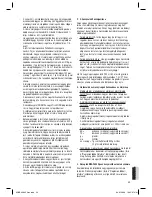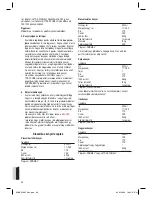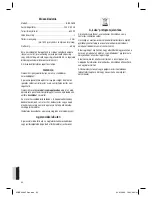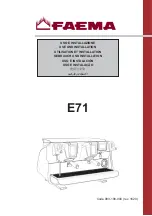
E
N
G
LI
S
H
ENGLISH
50
2. Adapting the doses
If the doses need to be increased or reduced, make sure that
the proportions of the original recipe are maintained. To obtain
a perfect result, the basic rules below for the adapting of the
ingredient doses must be following:
• Liquids/fl our: the dough ought to be soft (not too soft) and
easy to knead without becoming stringy. A ball can be
obtained by kneading it lightly. This is not the case with
heavy doughs like rye wholemeal or cereal bread. Check
the dough fi ve minutes after the fi rst kneading. If it is too
moist, add some fl our until the dough has reached the right
consistency. If the dough is too dry add a spoonful of water
at a time during the kneading.
• Replacing liquids: When using ingredients containing liquids
in a recipe (e.g. curd cheese, yogurt, etc.), the required
amount of liquid must be reduced. When using eggs beat
them in the measuring beaker and fi ll it with the other
required liquid up to the envisaged amount.
If you are living in a place located at a high altitude (more than
750 m) the dough rises faster. The yeast can be reduced in
these cases by 1/4 to 1/2 of a teaspoon to proportionally reduce
its rising. The same is true of places with particularly soft water.
3. Adding and measuring the ingredients and quantities
• Always put in fi rst the liquid and the yeast at the end. To
avoid that the yeast acts too fast (in particular when using
the timing function), contact between the yeast and the
liquid must be avoided.
• When measuring use the same measuring units, that is to say
use either the measuring spoon supplied with the bread ba-
king machine or a spoon used in your home when the recipes
require doses measured in tablespoons and teaspoons.
• The measures in grams must be weighed precisely.
• For the millimeter indications you can use the supplied measu-
ring beaker which has a graduated scale of 50 to 200 ml.
The abbreviations in the recipes mean:
EL
= level tablespoonful (or large measuring spoon)
TL
= level teaspoonful (or small measuring spoon)
g
=
grams
ml
=
milliliter
Packet
= 7g dry yeast for 500 g of fl our –
corresponds to 20 g of fresh yeast.
• Fruit, nuts or cereal ingredients. If you wish to add other
ingredients, you can do so in specifi c programs (see the
“Program Phase Timing” table), when you here the acoustic
signal. If you add the ingredients too early, they will be
crushed during the kneading.
4. Recipes for the BBA 2605 type bread baking machine
The following recipes are for various bread sizes. In some
programs a difference is made in the weights. We re com mend
you to use Stufe I (ULTRA SCHNELL I) for a bread loaf of 750 g
and Stufe II (ULTRA SCHNELL II) for a bread loaf between 750
and 1000 g.
Note:
The recipes should be adapted to the respective weight.
5. Bread weights and volumes
• In the following recipes you will fi nd exact indications
regarding the
bread weight
. You will see that the weight of
pure white bread is less than that of wholemeal bread. This
depends on the fact that white fl our raises more and hence
limits need to be posed.
• Despite the precise weight indications there may be slight
differences. The actual bread weight depends much on the
air humidity of the room at the moment of the preparation.
• All breads with a substantial portion of wheat reach a large
volume and exceed the container edge after the last rising in
the case of the highest weight class. But the bread does not
spill over. The part of the bread outside the tin is more easily
browned compared to the bread in the tin.
• When the SCHNELL or ULTRA SCHNELL program is
suggested for sweetbreads, you can use the ingredients in
smaller quantities also for the SÜSSES BROT program to
make a lighter bread.
6. Baking results
• The result of the baking depends on the on-site conditions
(soft water – high air humidity – high altitude – consistency
of the ingredients, etc.). Therefore, the recipe indications
are reference points which can be adapted. If one recipe or
another does not go straight the fi rst time, do not let yourself
be discouraged. Try to fi nd the cause and try it again by
varying the proportions.
• If the bread is too pale after baking, you can leave it to
brown with the baking program.
• It is recommended to bake a test bread before actually
setting the timing function for use overnight so that you can
make the necessary changes if necessary.
Classic Bread Recipes
White Bread
Components
Water or milk
300 ml
Margarine or butter
1 1/2 tbsp
Salt
1
tsp
Sugar
1
tbsp
550 type fl our
540 g
Dry yeast
1 packet.
Program „NORMAL“
Nut & Raisin Bread
Components
Water or milk
350 ml
Margarine or butter
1 1/2 tbsp
Salt
1
tsp
Sugar
2
tbsp
405 type fl our
540 g
Dry yeast
1 packet
Raisins
100
g
Crushed walnuts
3 tbsp
Program „NORMAL“
Raisins and nuts can be added after the fi rst beep or after the
1st kneading cycle.
05-BBA 2605 Neu.indd 50
05-BBA 2605 Neu.indd 50
04.01.2008 10:45:04 Uhr
04.01.2008 10:45:04 Uhr


